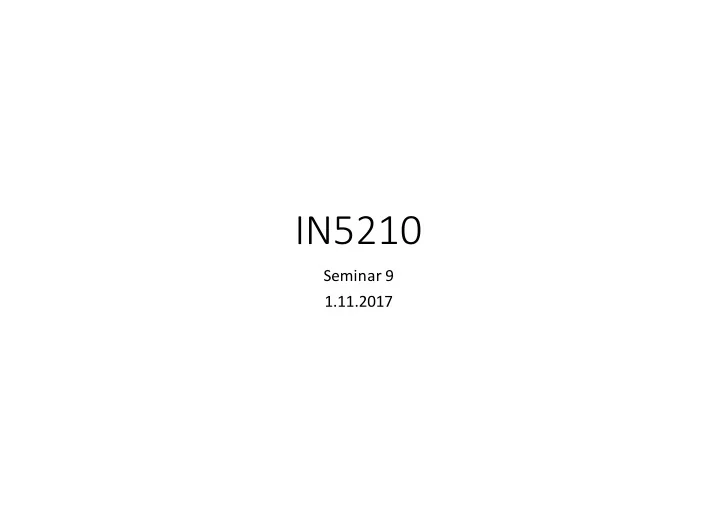

IN5210 Seminar 9 1.11.2017
Agenda Session 1 Rodon and Hanseth (2017) Session 2 Mock exam, and some tools to help you answering it
Summaries and questions
Group session Work in groups until 10.50 1. What is assemblage theory? 2. What role does this theory play in the paper? 3. What is the main point of the paper (i.e. what would you cite it for)?
Mock exam: Formalities Purpose: To rehearse the actual exam Deadline: November 13 th , 23:59 (on devilry) Feedback: Individual (10 minute) feedback will be provided. Schedule will be published later. • Wednesday, November 15 th, 10.00-13.00 • Friday, November 17 th , 10.00-13.00
Mock exam: Introduction Mock exam in: IN5210 Information Systems • Your answer should be between 2000 and 3000 words. You can choose to answer the exam in Norwegian or English. • The exam consists of two assignments. These assignments must be answered individually and in the order they are given. The assignments are weighted equally, so spend equal time and space on both of them. • The exam is based on the research article “Large-Scale Complex IT Systems” by Ian Sommerville et al. (it is made available for you in the usual closed folder on the website of the course). • This exam document is on 2 pages.
Mock exam: Assignment 1 Assignment 1: Read and summarize the research article • 1a. Describe and explain information systems practice issues raised in the research article. • 1b. Describe and explain the central argument(s) in the research article. • 1c. Describe and explain the central concept(s) and how they are used in the research article.
Mock exam: Assignment 2 Assignment 2: Relate the research article to the syllabus • 2a. Discuss critically the strengths and the weaknesses of the research article, for instance with regards to methodology, clarity, and theoretical rigor. • 2b. Describe how the research article can be related to 2-3 relevant core readings in the IN5210/INF5210 syllabus. You can approach this by for example discussing how they focus on similar or complementary information systems practices, how they make similar or contrary arguments, how they make similar or complementary contribution and/or how they relate to the same or different information systems theories or concepts. • 2c [optional]. Discuss how theories from the IN5210/INF5210 syllabus can potentially add to our understanding of the phenomenon described in the research article.
Referencing • Through referencing, you demonstrate: • that you master an essential element of academic writing • that you have understood the norms of scientific integrity • Source: http://www.ub.uio.no/english/writing-publishing/referencing/index.html
Referencing: in the text “In the case of the digital platform perspective, which has been dominant in the IS and management fields, existing studies mainly focus on single ecosystems adopting the perspective of the platform orchestrator or owner (Eaton et al. 2015; Parker et al. 2016; Tiwana 2014; Wareham et al. 2014). This unit of analysis neglects the fact that large-scale systems usually serve a community in which several ecosystems partially overlap (Markus and Loebbecke 2013)”
Referencing: in the list of literature
Don’t be a caveman… • But use bibliography software like Zotero, Endnote, etc. • Revisit slides from lecture 2
Booth: Making a claim and supporting it (availablein literaturefolder)
In your arguments, consider the following
Requirements for a scientific claim Your claim should be specific and significant (for the reader) You must provide reasons ; the ‘because’. However, people can make up reasons. Therefore you must also provide evidence : this is something you and your readers can taste, feel, inspect: in short, facts
What can the evidence for theoretical argumentation be?
What can the evidence for theoretical argumentation be? Key criteria: • Reliable and based upon authoritative and trustworthy research and sources • Appropriately cited • Designed to appeal to your target audience’s values and priorities • Ample enough to convince
Remember to acknowledge and consider the counterarguments
Example: What can you say about this argumentation? “There are great excitement and high hopes for patient-centred e-health services: they are expected to enable patient empowerment and self-management as well as improve quality and efficiency of care [1-3]. However, at present most of these benefits are largely hypothetical and the clinical effectiveness and cost-effectiveness of these solutions have not been demonstrated [4,5]. In addition, several authors warn that patient-centred e-health services may have detrimental effects on the patient-clinician relationship and that they in some cases may force patients to take on tasks and responsibilities that they do not feel capable of dealing with [5-8]. Indeed, the inclusion of patients as users of e-health services introduces a whole new class of challenges for health informatics. Patients have different concerns and needs than physicians and other health professionals and these concerns and needs must be satisfactorily addressed if patient-centred e-health services are to be successful. However, it seems that researchers and designers, in general, do not truly understand the scope and complexity of this task. To address this issue, we look into how patients‘ perceptions of illness differ from clinicians‘ and explore the implications for the design of patient-centred e-health services.”
Work Step 1 • Download the mock exam assignment and research article. Step 2 Individual: Read the exam text thoroughly and skim the research article: • Do you have any questions to the assignment? • Brainstorm: What research papers from the course syllabus could be relevant to draw upon in your response to question 2b? Step 3 • Groups: Share your thoughts about the assignments and possible course literature in the group.
Recommend
More recommend